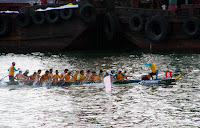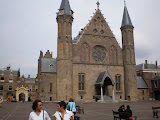In de 2 weken dat wij in NL waren is er een ongeluk gebeurd met de kabelbaan in Tung Chung.
Heel fijn. Vooral omdat ik van plan was om Arlene en de kids mee te nemen de kabelbaan in. En omdat ik er pas nog had in gezeten. Ik moet altijd denken als ik in zo'n ding zit, dat het afbreekt, of naar beneden valt.
En mijn angst is dus terecht! Lees en huiver!!!
Dit kranteknipsel komt uit de Standard- China's Business Newspaper
Skyrail firm told to fire staff if liable for accident Skyrail-ITM - the Australian firm behind the Ngong Ping 360 cable car system on Lantau - will be asked to replace its entire management team if it is found to be responsible for the incident Monday in which a cabin plunged 50 meters to the ground after becoming detached from the cable.
Mimi Lau and Diana Lee Wednesday, June 13, 2007Skyrail-ITM - the Australian firm behind the Ngong Ping 360 cable car system on Lantau - will be asked to replace its entire management team if it is found to be responsible for the incident Monday in which
a cabin plunged 50 meters to the ground after becoming detached from the cable.
The warning came from Secretary for Economic Development and Labour Stephen Ip Shu-kwan Tuesday as he announced a thorough investigation will be launched with the help of overseas experts.
The probe is expected to be completed within a month.
The incident was the first of its kind at the Lantau tourist attraction since the trouble-plagued cable car system began operation in September last year.
Ip said the investigation will cover not only the mishap itself, but also the overall management and maintenance of the system.
"If it turns out to be a management problem, we'll ask MTR Corp [which owns and operates the project] to do what it needs to do."
He said that, according to the Aerial Ropeways (Safety) Ordinance, the director of the Electrical and Mechanical Services Department is empowered to request the corporation to have a management team that is capable of handling the skyrail system.
"We're taking safety as our top priority. Unless and until the director is satisfied with the safety of the system, we'll not allow the service to resume," Ip said.
Cable car services at Tung Chung - which is linked to the famous Big Buddha by the system - have been ordered to be suspended indefinitely until it can be established what went wrong.
No one was injured in Monday evening's incident in which the empty cable car crashed to the ground during a test run after operating hours.
Immediately after the crash, maintenance staff members were sent to each of the system's supporting towers to examine if other cabins had plunged along the whole ropeway.
Investigators found some 10 gear wheels had been seriously damaged on the system where the cable car plunged.
The gear wheels, installed on the towers, are used to hook cable cars in place as they pass the towers.
Investigators are still trying to find out how these gears were damaged and whether the damage was related to the crash.
An inside source revealed to The Standard Tuesday the mishap was associated with a decision by Skyrail- ITM's senior management to boost passenger capacity during peak periods.
According to the source, it was the first time Skyrail had tried to push the motors of the "circulating bi-cable aerial ropeway" system to the fullest and unprecedented speed of seven meters per second. "The system has always been tested on five meters per second even at its initial trial runs. It's a senior management decision to test the system's fullest operational speed and its emergency braking.
"With a nearly 30-40 percent speed enhancement, the journey time could, therefore, be shortened, enabling a faster circulation of cabins. At least 3,000 to 4,000 extra passengers a day could be carried," the source said.
Currently, the highest passenger load recorded is about 11,000 per day. According to Skyrail, the system's maximum load can be boosted to 3,500 passengers an hour. The whole ropeway circulates 109 cabins at an average speed of four to five meters per second.
It takes 20 to 25 minutes to finish the 5.7-kilometer journey from Tung Chung to Ngong Ping.
According to an international expert from the world's largest ropeway construction company, operating on seven meters per second is "not common," and he was shocked to hear of the accident. "Bi-cable aerial ropeway is what we call one of the pioneering ropeways.
"Such an installation is not so common around the world," said Christoph Hinteregger, technical director at Austria-based Doppelmayr Seilbahnen.
"There aren't many models that can successfully run at seven meters per second, operators of bi-cable aerial ropeway still need to gather more experience," he told The Standard by phone from Switzerland.
Hinteregger said while "the maximum speed of a circulating bi-cable aerial ropeway is not theoretically unachievable," it can depend other factors like weather conditions such as wind and smog.
A spokesman for Skyrail-ITM refused to comment on whether the system was running at seven meters per second under an "ongoing review."
However, the spokesman admitted that an increased speed would help boost passenger load and the company is promoting Ngong Ping 360 in other countries.
The spokesman also denied there was any relationship between enhanced speed and passenger capacity.
After a three-day annual review was performed in early June to adjust ropeway tension, Leitner Ropeways programmers were adjusting a monitoring system called the Scada System, the source said.
The system is designed to monitor various functions during operations, including distance between cabins, motors, cabin doors and wind speed.
A fault message would be sent out and the system halted should the monitoring system detect any abnormalities, the source said.
But it was discovered a few hours before Monday's accident that a door on a cabin departing Ngong Ping for Tung Chung failed to close tightly, leaving a space of "two to three fingers."
"It was Monday afternoon, right before the accident took place, but the monitoring system didn't send out any alarm message. The cabin kept on operating," the source said.
The company performed emergency braking while the cable cars were operating at the maximum speed of seven meters per second, when suddenly "ka ka" noises were heard. Right after that, a fault alarm was raised, suggesting there had been problems in Tower 2B.
A Skyrail statement said an engineering team had been investigating since Monday night.
The Legislative Council will hold a special meeting of its economic panel Friday to discuss the incident.
 Het is net of ik of niets anders kan praten, maar de 10 year hand-over anniversary, beheerst hier nogal het leven.
Het is net of ik of niets anders kan praten, maar de 10 year hand-over anniversary, beheerst hier nogal het leven.











































